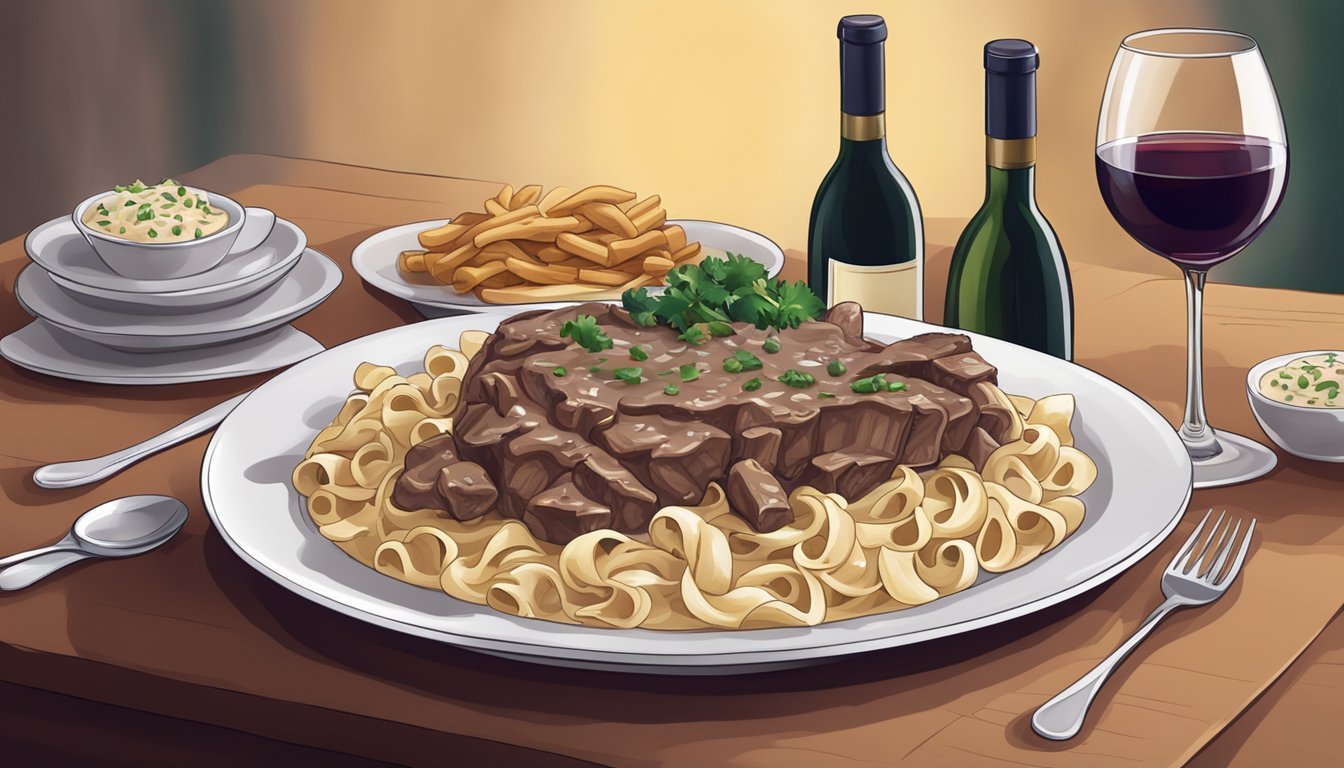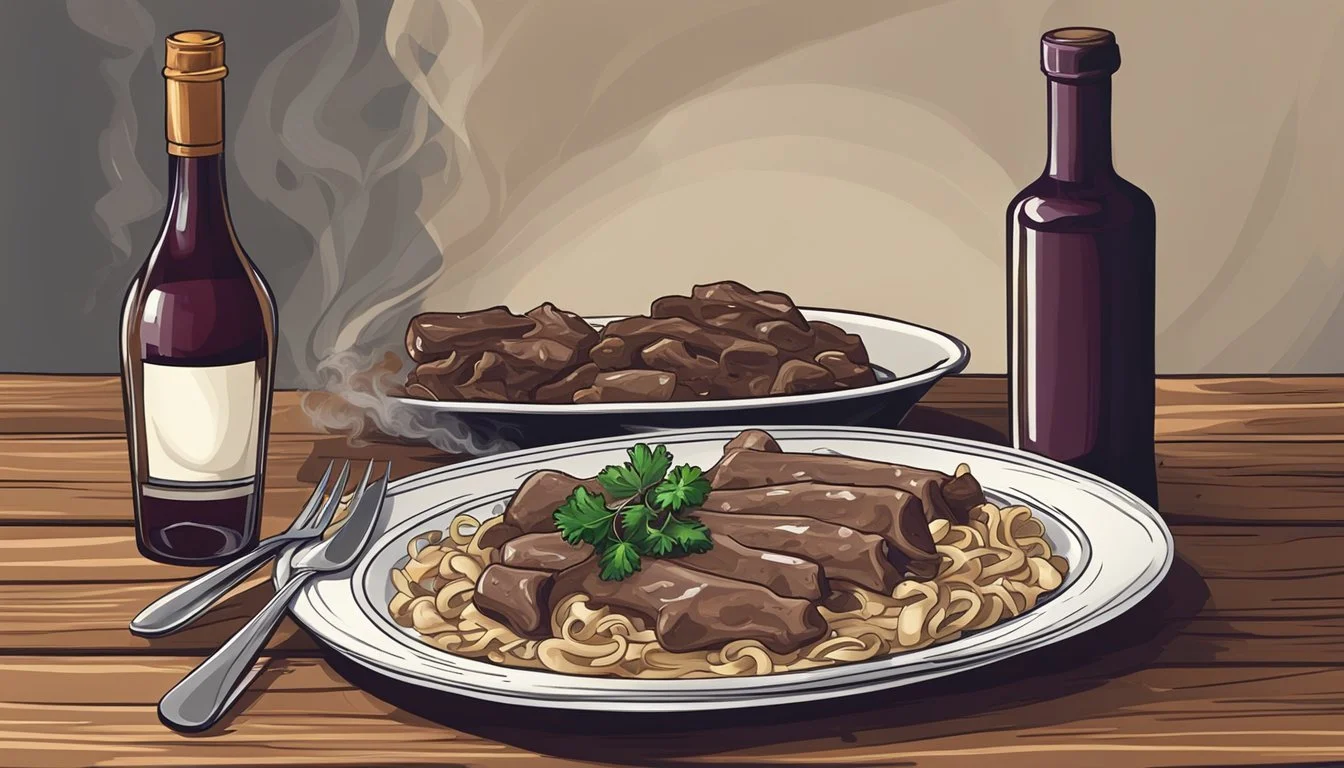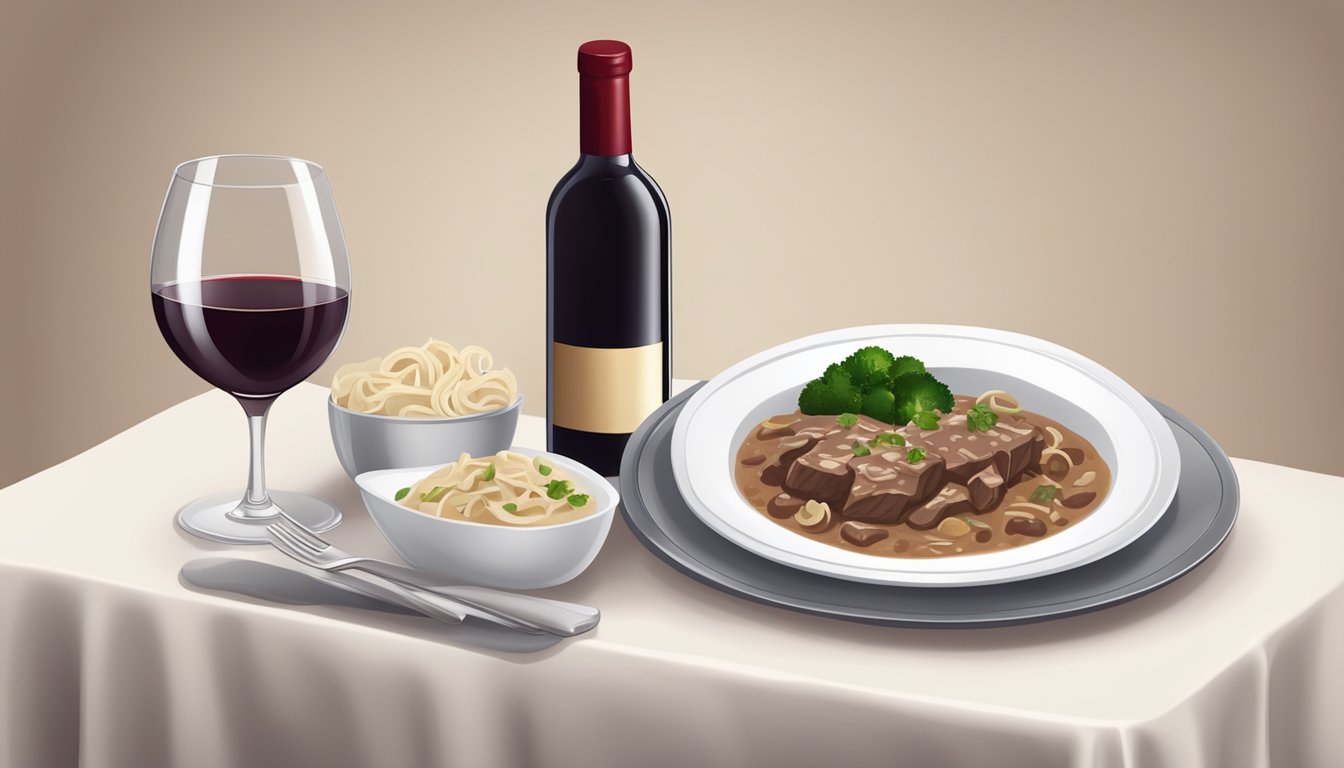What Wine Pairs Perfectly with Beef Stroganoff
Expert Recommendations
Selecting the perfect wine to accompany beef stroganoff (What Wine Pairs Perfectly with Beef Stroganoff?) can elevate this classic dish to new heights. Beef stroganoff, with its tender strips of beef in a rich and creamy sauce flavored with mushrooms (What wine goes well with mushrooms?) and onions, presents a delightful challenge for wine pairing. The balance of creaminess and savory depth requires a wine that complements both the heft of the beef and the velvety texture of the sauce without overwhelming the palate.
Full-bodied red wines often rise to the occasion, bringing bold flavors that stand alongside the robust elements of the dish. Varietals such as Cabernet Sauvignon or Merlot are popular choices, offering the structure needed to match the stroganoff’s richness. Meanwhile, wines like Pinot Noir can be apt selections for those seeking a red with a lighter touch, yet still possessing enough complexity to interact harmoniously with the dish's flavors.
For those who favor white wine, selections with enough body and acidity are key. An oaked Chardonnay can provide a buttery counterpoint to the creamy sauce, while a Riesling, with its crisp acidity, may serve as a refreshing contrast, cleansing the palate between bites. The ultimate goal is to achieve a harmonious dining experience where the chosen wine complements the beef stroganoff, ensuring each element is appreciated to its fullest.
History of Beef Stroganoff
Beef Stroganoff has a rich history as a classic dish that exemplifies the evolution of comfort food over several centuries.
Origins of the Dish
Beef Stroganoff's journey began in Russia during the early 19th century. It is named after the Stroganov family, a noble household known for their patronage and influence. The original recipe was likely a refined version of traditional Russian beef dishes and was intended to be easily digestible for the ailing Count Alexander Stroganoff. This simple yet savory meal quickly gained popularity and became a staple of Russian cuisine.
Evolution Over Time
Over the years, Beef Stroganoff underwent numerous transformations that reflected changing tastes and cooking methods. By the mid-20th century, it had become a symbol of comfort food and was embraced globally in different forms. In the United States, the dish evolved to include a creamy sauce with sour cream, becoming a ubiquitous fixture in cookbooks and family dinners. Today, variations of Beef Stroganoff can be found in countless countries, each adding its own local flair to this historical classic.
Essential Ingredients of Beef Stroganoff
Understanding the fundamental components of beef stroganoff is key to creating a dish with the right flavor profile and texture. The ingredients come together to form a luxurious and creamy sauce offset by tender meat and earthy mushrooms.
Base Components
Beef: The star of the show is usually a high-quality cut like sirloin or tenderloin, thinly sliced for quick cooking and tenderness.
Mushrooms: Commonly, button or cremini mushrooms are used for their meaty texture and ability to absorb flavors.
Onions: Typically diced, they add a necessary depth of flavor.
Garlic: Minced or finely chopped, garlic contributes a pungent and aromatic touch to the dish.
Sour Cream: Sour cream is essential for the characteristic tangy, creamy sauce.
Beef Broth: Provides a rich base for the sauce, enhancing the overall meaty flavor.
Egg Noodles: Often served with the stroganoff, egg noodles are the traditional choice for soaking up the sauce.
Butter: Used for sautéing and bringing a silky richness to the dish.
Herbs and Seasonings
Black Pepper: Freshly cracked black pepper adds a spicy kick, contrasting with the creaminess of the sauce.
Spices: While beef stroganoff doesn’t rely heavily on a wide range of spices, a pinch of paprika sometimes finds its way into the recipe.
Flavor Profile Enhancers: Depending on the recipe, one might find additional ingredients like Dijon mustard, Worcestershire sauce, or brandy to enrich the flavor palette further.
Wine Pairing Fundamentals
Selecting the right wine to complement beef stroganoff involves understanding the interaction between the wine's characteristics and the dish’s flavors. A harmonious balance is crucial for an optimal dining experience, with personal preferences always taken into account.
Understanding Tannins
Tannins are natural compounds found in grape skins, seeds, and stems. In wine, they contribute to the structure and mouthfeel, often providing a sensation of dryness. The creaminess of beef stroganoff can soften the astringency of tannins in wines like Cabernet Sauvignon or Bordeaux, which tend to be high in tannins.
Effect of Acidity
Acidity in wine cuts through rich, creamy, or fatty foods, cleansing the palate and creating a refreshing contrast. For beef stroganoff, wines with high acidity can offer a counterbalance to the dish's heavy cream-based sauce and enhance the flavors. A full-bodied Chardonnay or a light Pinot Noir are examples of wines with the right acidity levels for such a pairing.
Body and Balance
The body of a wine, whether light, medium, or full, should be matched with the dish's weight. Beef stroganoff, being a rich dish with beef and a creamy sauce, pairs well with full-bodied red wines that provide a harmonious balance of flavor intensity. Wines like Merlot, Malbec, and Zinfandel have the body to stand up to this hearty dish.
Wine Pairing Techniques
When pairing wines with beef stroganoff, one must consider the dominant flavors of the dish. Spices, beef, and the creamy texture of the sauce need to be matched with wines that complement these elements without overpowering them. Techniques include pairing by congruence—echoing the flavors in the wine and dish, or by contrast—selecting a wine that provides a palate-cleansing effect. Syrah and Pinot Noir offer such congruent and contrasting pairings respectively, often based on their fruit profiles and the dish's characteristics.
Recommended Red Wines for Beef Stroganoff
Pairing the right red wine with Beef Stroganoff enhances the flavors of the dish. Full-bodied red wines with balanced tannins complement the creamy sauce and tender beef, creating a harmonious dining experience.
Syrah/Shiraz
Syrah, also known as Shiraz, is a full-bodied red wine with robust tannins. It offers a peppery profile that marries well with the rich and savory elements of Beef Stroganoff. Wine enthusiasts can explore a Shiraz from regions like Australia or a Syrah from the Rhône Valley to pair with this dish.
Pinot Noir
Pinot Noir, with its origins in Burgundy, possesses a lighter body compared to other red wines, yet it maintains enough depth to stand up to the creamy texture of Beef Stroganoff. Its inherent earthy notes and subtle acidity provide a counterbalance to the dish's richness, making it an elegant pairing choice.
Merlot
Merlot is known for its smooth tannins and juicy fruit flavors, which complement the creamy and meaty components of Beef Stroganoff without overwhelming them. A Merlot from Bordeaux brings a balance between fruit and structure, integrating seamlessly with the meal.
Cabernet Sauvignon
Cabernet Sauvignon, especially from Bordeaux, offers a more structured wine with higher tannins. This full-bodied red wine has the heft to counterbalance Beef Stroganoff's substantial characteristics, yet its cassis and herbal notes prevent it from dominating the flavor profile of the dish.
White and Rosé Wines as Alternatives
While traditional pairings lean toward red wines, white and rosé wines offer a refreshing contrast to beef stroganoff's rich and creamy sauce, complementing the savory notes of beef and mushroom with crisp acidity.
Chardonnay and White Burgundy
Chardonnay, with its full-bodied texture and potential for oak-induced richness, can mirror the creamy elements of beef stroganoff. White Burgundy, a specific category of Chardonnay from the Burgundy region in France, tends to exhibit high acidity and a balance of fruit and oak flavors that support, rather than overwhelm, the dish's components.
Riesling
Riesling, known for its vibrant acidity and intrinsic fruitiness, can cut through the dish's creamy sauce. When selecting a Riesling, one should look for drier versions to avoid a clash of sweetness with the savory profile of the beef stroganoff.
Rosé Wines
Rosé wines, offering a middle ground with qualities of both red and white wines, make for an intriguing pairing. The key is to seek out a rosé with enough body to stand up to the beef and mushrooms, while its high acidity refreshes the palate between bites, enhancing the layers of flavor within the dish.
Ideal Wine Characteristics for Beef Stroganoff
Selecting the right wine to pair with Beef Stroganoff involves considering the flavor profiles that match the complexity of the dish as well as the texture and tannin content of the wine to ensure a harmonious dining experience.
Flavor Profiles
The classic Beef Stroganoff presents a rich tapestry of flavors, including tender beef, earthy mushrooms, and a creamy sauce. Wines that exhibit notes of cherry and plum are particularly well-suited, as these fruit flavors offer a sweet complement to the savory tones of the dish. Additionally, a wine that hints at spices can echo the seasoning in the Stroganoff, creating a cohesive taste experience.
Complement vs Contrast
Regarding Beef Stroganoff, there's a delicate balance between choosing a wine to complement the dish and one to contrast it. For complementing, look for wines with a mushroomy or earthy undertone, as this will resonate with the base flavors of the dish. On the other hand, to contrast the creamy richness, wines with a good level of acidity can provide a refreshing counterpoint, cleansing the palate between bites.
Complement: Earthy undertones
Contrast: Bright acidity
Wine Texture and Beef Stroganoff
The texture of the wine is as crucial as its taste. A full-bodied red wine has the structure to stand up to the heft of Beef Stroganoff. The creaminess of the dish calls for wines that are robust, yet not overwhelming. Ideal wines should have a good concentration of tannins to cut through the creaminess without dominating the flavors. The tannins should be present but smooth so as to not clash with the velvety sauce.
Body: Full-bodied red
Tannin: Present, smooth
Special Considerations
When selecting a beverage to accompany beef stroganoff, it's important to consider both those who prefer non-alcoholic options and individuals with dietary restrictions. The goal is to enhance the dining experience while ensuring inclusivity.
Non-Alcoholic Beverages
For diners who do not consume alcohol, the choice of beverage remains an integral part of the meal. A proper selection can elevate the flavors of beef stroganoff without the presence of wine. The recommended non-alcoholic pairings include:
Sparkling Grape Juice: It mimics the effervescence and subtle fruitiness of a traditional wine.
Cranberry Juice: Offers a tart contrast that can cut through the richness of the stroganoff.
Ginger Ale: With its light, fizzy character, it provides a refreshing cleanse to the palate.
Dietary Restrictions
Diners with dietary restrictions, such as gluten intolerance or a low-sodium diet, must be given special consideration. The beverages chosen should not only complement the dish but also adhere to their dietary needs. Options include:
Gluten-Free Beer: A variety of gluten-free beers are now available that can pair well with the savory notes of the stroganoff.
Low-Sodium Vegetable Broth: Warmed and seasoned, it can be a comforting alternative that complements the beefy and creamy elements of the dish.
Pairing Wines with Variations of the Dish
The versatility of stroganoff allows for various main ingredients which can influence the choice in wine pairings. The right wine can complement the rich flavors and textures, whether it is a classic beef stroganoff or a variation with chicken, mushrooms, or plant-based alternatives.
Chicken Stroganoff
For a lighter chicken stroganoff, one might opt for a medium-bodied white wine like a Chardonnay or a Viognier. These wines balance the creamy sauce with their bright acidity and fruit notes.
Recommended White Wines:
Chardonnay
Viognier
Vegetarian and Vegan Options
Vegetarian and vegan stroganoffs often use lentils or tofu as protein substitutes. A light to medium-bodied red wine such as a Gamay or a Barbera pairs well without overpowering the dish.
Recommended Red Wines for Vegetarian/Vegan Stroganoff:
Gamay
Barbera
Mushroom Stroganoff
A mushroom stroganoff with its earthy flavors calls for a wine with depth yet subtle enough not to compete with the mushrooms. A Pinot Noir is a perfect match for its earthiness and lighter tannins.
Recommended Wine for Mushroom Stroganoff:
Pinot Noir
Dessert Pairings
Following a stroganoff main course, a dessert wine should be selected to cleanse the palate. A semi-sweet Riesling or a Moscato can provide a refreshing contrast to the richness of the stroganoff.
Recommended Dessert Wines:
Riesling
Moscato
Storing and Serving Wine
When considering the optimal storage and serving conditions for wine, one must account for temperature, aeration, and proper glassware to ensure the wine's character complements dishes like beef stroganoff effectively. These factors are critical in preserving wine's flavor profile, which includes tannins and body, and are essential for harmonious wine pairings.
Temperature Considerations
Proper Storage: Maintaining the correct storage temperature is crucial for preserving wine's quality. For full-bodied red wines that pair well with beef stroganoff, such as Cabernet Sauvignon or Merlot, the ideal storage temperature is between 55°F and 65°F.
Reds: Serve full-bodied red wines slightly below room temperature, around 60°F to 65°F, to enhance the tannins and complement the body of the dish.
Whites: If serving a white like Chardonnay, aim for 45°F to 50°F to preserve its bright acidity that can cut through the creamy sauce of stroganoff.
Decanting and Aeration
Purpose of Decanting: Decanting is recommended for red wines with robust tannins to soften them and open up the wine's full array of flavors.
Timing: Decant robust red wines for at least 30 minutes before serving; this allows the wine to breathe and fully express its character.
Effect on Pairings: Aerated wine can enhance the pairing experience by marrying more seamlessly with the richness of beef stroganoff.
Glassware
Appropriate Selection: The right glassware is essential for the wine to reveal its true nature.
Red Wine Glasses: A large-bowled glass is ideal for full-bodied red wines, offering ample space for swirling and aerating the wine.
White Wine Glasses: A smaller bowl is suited for white wines, which focuses the more delicate aromas and maintains a cooler temperature.
Selecting the correct glassware ensures the wine's bouquet, body, and balance are fully appreciated, especially in the context of a dish such as beef stroganoff, where the harmonization of flavors is crucial.
Exploring Wine Regions
When pairing wines with beef stroganoff, it is essential to consider the distinctive characteristics of wines from various regions, as they can significantly influence how they complement the dish.
Old World vs New World Wines
Old World wines refer to those from traditional winemaking regions in Europe, where terroir plays a crucial role. These wines often exhibit nuanced flavors and a sense of place. New World wines from countries such as the United States, Australia, and Chile, tend to be fruit-forward with a more modern approach to winemaking.
Old World examples like a French Burgundy (Pinot Noir) or an Italian Nebbiolo can offer a balance of acidity and complexity that pairs well with the creamy and savory notes of beef stroganoff.
New World options may include a Californian Cabernet Sauvignon or a Chilean Merlot, which can provide bold fruit flavors to stand up to the richness of the dish.
Famous Wine Regions
Understanding the famous wine regions can deepen appreciation for the potential pairings with beef stroganoff. Regions such as Bordeaux and Burgundy in France, the Rhône valley, Italy's Piedmont region, and the Tuscan area are renowned for their offerings.
Bordeaux: Known for Cabernet Sauvignon and Merlot blends, Bordeaux wines offer structure and depth that can complement beefy flavors.
Burgundy: Pinot Noir from this region provides a lighter, more acidic counterpoint to the dish.
Rhône: Wines here, particularly Syrah, are bold and spicy, making them well-suited for the hearty elements of stroganoff.
Piedmont: The Nebbiolo grape, primarily from the Barolo and Barbaresco wines, delivers high acidity and grippy tannins which balance the creaminess of the sauce.
Tuscan: A Tuscan blend like Chianti, based on the Sangiovese grape, brings both acidity and a hint of earthiness to the pairing table.
This exploration emphasizes the diversity and compatibility of wines with beef stroganoff, guided by the unique profiles of each wine region.
Conclusion
Beef Stroganoff, with its creamy sauce and savory components, pairs exceptionally well with certain types of wine. Full-bodied red wines are recommended due to their ability to complement the rich flavors of the dish. Wines such as Cabernet Sauvignon, Merlot, and Syrah work well because their robust profiles can stand up to the creaminess of the Stroganoff.
Alternatively, for those preferring a lighter pairing, a Pinot Noir can provide a more subtle complement to the dish, balancing the creaminess without overpowering the flavors. When selecting a wine, one should consider the profile of the Stroganoff, aiming to balance the richness of the beef and the acidity in the wine.
In considering acidity, a wine that offers a refreshing counterpoint works best. Acidity in a wine can cut through the dish's creaminess, providing a palate-cleansing effect that enhances the dining experience.
Here's a simple list of wine selections for Beef Stroganoff:
Cabernet Sauvignon: Rich and bold, a classic choice for hearty dishes.
Syrah/Shiraz: Offers a spicy note that can enhance the beef.
Merlot: Softer tannins but still full-bodied enough for the dish.
Malbec: Known for its dark fruit flavors and smoky finish.
Zinfandel: A robust wine that can hold its own against Stroganoff.
Pinot Noir: For a lighter option, still capable of complementing the dish.
It's crucial to select a wine that one enjoys and believes will pair well with their particular variation of Beef Stroganoff. Personal preference should ultimately guide the choice, ensuring an enjoyable meal.









